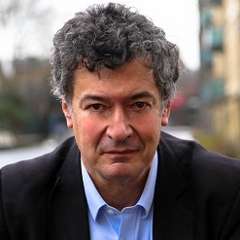Bach's Brandenburg concerto No. 3 (BWV 1048) doesn't have a slow movement. In the place where you would normally expect to find one, what's written out is just two chords. And in most modern performances, those chords get a perfunctory embellishment, a quick bit of a cadenza, and on we go. That's the shape in which the piece now sits in the classical canon, so nobody expects more than that. The players, for example, can't wait to hunker down to the third movement, a joyous G major allegro, 48 bars plus repeats of 12/8, rosin flying, semiquavers in perpetual motion, see you at the end.
On the internet I've across people who do like to give their opinions on this question. Some are merely nerdy. Others are downright weird. Reading their discursions, the whole thing can start to resemble the question of why Swiss cheese has holes in it.
But for the Aurora Orchestra's concert on Saturday in the Corn Exchange in Cambridge, a repeat of a programme given a week before in LSO St Luke's in London, conductor Nicholas Collon not only conceived of a superb idea, he also put it into practice. He chose to insert Arvo Pärt's "If Bach had been a Beekeeper" in the place of the missing slow movement. And in doing so he would appear to be onto something good. To my knowledge, it's the first time it's been done, but the idea is bound to be tried again,so I hope that Collon gets all the credit due to him for having dreamt it up.
The Pärt brought on the Aurora's superb principal wind players, notably bassoonist Christopher Cooper, with a bassoon tone as solid as a house. The piece was moody, it was magnificent. And the stillness and concentration of the Pärt provided a superb jumping-off point for an allegro movement which was quick, but in Collon's hands almost completely, wonderfully weightless.
This kind of innovation, this informed risk-taking is what Aurora does. Another bold stroke which really worked was to bring in a group of acrobatic and immensely physical capoeira dancers to dance over a suite of dances from Rameau's Platee. Another was to commission a chamber orchestra arrangement of Balakirev's piano warhorse Islamey. Maybe less successful was Julian Anderson's fiendish Khorovod, which received a performance with respect for every detail, and great energy, but which for me outstayed its welcome.
The Aurora Orchestra play with passion and huge flair, and are set to make a lot of new friends and admirers at their BBC Proms debut in a children's concert on the morning of Monday August 30th.


